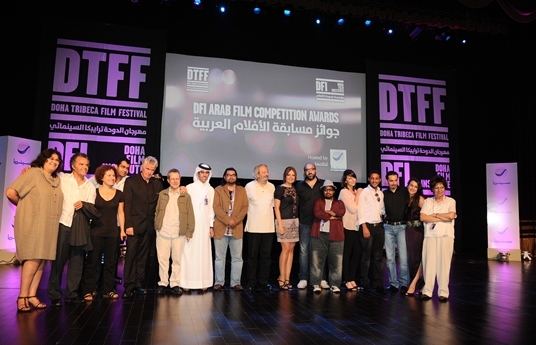Normal and The Virgin, The Copts And Me take DTFF Arab Film Competition Awards
Oct 29, 2011 — Film Festival

Rania Stephan and Roschdy Zem take Best Documentary and Best Narrative Director prizes
Sami Bouajila wins Best Performance Prize
Doha, October 29 2011 –The third Doha Tribeca Film Festival (DTFF) today announced the results of jury deliberations in the Arab Film Competition to a packed auditorium of film industry guests from around the Arab World and beyond.
Normal, directed by Merzak Allouache, and The Virgin, The Copts and Me (La Vierge, Les Coptes et Moi), directed by Namir Abdel Messeeh, won the Arab Film Competition for Best Narrative Film and Best Documentary Film, respectively.
Rania Stephan, director of The Three Disappearances of Soad Hosni (Ikhtifa’aat Hosni Alt-Thalathat), and Roschdy Zem, director of Omar Killed Me (Omar M’a Tuer) took the prizes for Best Documentary and Best Narrative Director.
Omar Killed Me also took home a prize for Best Performance by Sami Bouajila.
Prize monies for these awards are: USD 100, 000 each for Best Narrative and Best Documentary Films, USD 50, 000 to each director in the Best Documentary and Best Narrative Filmmaker categories, and USD 15, 000 for Best Performance.
The Best Arab Short Film (USD 10, 000) went to Where Are You? (Wenak?) by Abdulaziz Al-Nujaym, while Honorable Mention in the same category went to My Father Is Still a Communist – Intimate Secrets To Be Published (Abi Ma Zala Sheuaayan, Asrar Hamema Leljameea) directed by Ahmad Ghossein. Ghossein will receive USD 10, 000 in Development Services from DFI.
Mohamad Rezwan Al Islam and Jassim Al Romaihi took home a DFI Engraved iPad for their film, A Falcon, A Revolution (Is Saqar Wa is Sawra), which won in the ‘Made in Qatar’ programming segment.
Amanda Palmer, Executive Director of DFI, said: “Thank you for supporting the DTFF and the year-round efforts of DFI. It’s a huge pleasure to have you all here. There are so many prestigious filmmakers here, and the reason we have the festival is to discover new talent. We hope these talented people meet each other here and are able to make films together as a result.”
Jury President of the Arab Narrative Film Competition Mohammed Malas offered his congratulations to the winners: “We would like to thank the DFI first of all for the confidence that has been bestowed on us. This is one of the best festivals to raise the profile of youth cinema, which will create our future. It was not an easy task to select the winners, but Omar Killed Me is a genuinely humanitarian story that unravels the justice system in France with distinguished cinematic language. Normal expresses bravely what is going on in the region—the suppression of people’s expression and the state of confusion—with liberty, courage and warmth.”
Nick Broomfield, Jury President of the Arab Documentary Competition, said: “We’ve enjoyed watching a variety of different films. These filmmakers make it look deceptively easy, but taking unstructured reality and making it personal is a difficult thing to do. The Virgin, the Copts and Me was a very personal story, but deals with a broad subject matter. The people in it are loveable and very human. I wanted to spend the rest of my day with them, and if you can do that as a filmmaker, you have achieved a lot.”
Normal director Merzak Allouache said: “I would like to seize this opportunity to express my support of the democratic people and their struggle. The DTFF helped us to complete this film, and without their assistance, the film would be stuck in a box. I hope the film can be screened in Algeria and that it can help to change the way things are expressed there.”
Director of The Virgin, The Copts and Me Namir Abdel Messeeh said, “This movie speaks about religion. I found a passionate audience here for my film, although I was initially afraid to screen it here. I realized here in Doha that love is stronger than fear, and I hope that the film can screen in Egypt and that people there will realize it is not about division.” He went on to thank the Qatari Minister of Culture, His Excellency Dr. Hamad bin Adbulaziz Al-Kuwari, for taking him on his first trip to a cinema as a child in France, where his mother worked for the Qatari Embassy.
The festival held numerous free public community screenings and frequently sold out events. Outstanding attendance was exemplified by a Family Day that attracted thousands of locally-based visitors.
About Doha Film Institute (DFI):
The Doha Film Institute (DFI) is an independent cultural organisation established in 2010 to incorporate Qatar’s film initiatives under one banner.
Located at Qatar’s new cultural hub, Katara, DFI’s many initiatives include film and television funding for MENA and international films, year-round education programs, film screenings, and the annual Doha Tribeca Film Festival (DTFF).
In addition, DFI has established a number of strategic cultural partnerships with leading local and international organisations including Katara Cultural Village Foundation, Tribeca Enterprises, World Cinema Foundation, Maisha Film Labs and Giffoni Film Festival.
DFI was founded by H.E Sheikha Al Mayassa bint Hamad bin Khalifa Al-Thani. Along with Her Excellency, DFI leadership comprises DFI Board Vice-Chair and Festival Board Chair, H.E. Sheikh Mohammed Bin Fahad Al-Thani; DFI Board Member and Festival Board Vice-Chair, H.E. Dr. Hassan Al-Nimah; DFI Board Member, Mr. Mansoor Ibrahim Al-Mahmoud; Festival Board Member, H.E. Sheikh Jabor Bin Yousuf Al Thani; and DFI Executive Director, Amanda Palmer.